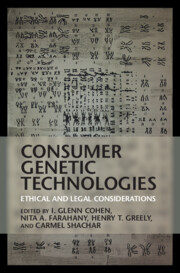Book contents
- Consumer Genetic Technologies
- Consumer Genetic Technologies
- Copyright page
- Contents
- Contributors
- Acknowledgments
- Introduction
- Part I Consumer Genetic Technologies: Rights, Liabilities, and Other Obligations
- Introduction to Part I
- 1 Liability Implications of Direct-to-Consumer Genetic Testing
- 2 Consuming Genetics As a Life Insurance Consumer
- 3 In Favor of an Action for Genetic Conversion
- 4 Direct-to-Consumer Genomics and Personal Health Data
- 5 Governance in the Era of CRISPR and DIY-Bio
- Part II Privacy in the Age of Consumer Genetics
- Part III Tinkering with Ourselves: The Law and Ethics of DIY Genomics
- Part IV Consumer Genetics and Identity
- Part V The Impact of Genetic Information
4 - Direct-to-Consumer Genomics and Personal Health Data
from Part I - Consumer Genetic Technologies: Rights, Liabilities, and Other Obligations
Published online by Cambridge University Press: 27 August 2021
- Consumer Genetic Technologies
- Consumer Genetic Technologies
- Copyright page
- Contents
- Contributors
- Acknowledgments
- Introduction
- Part I Consumer Genetic Technologies: Rights, Liabilities, and Other Obligations
- Introduction to Part I
- 1 Liability Implications of Direct-to-Consumer Genetic Testing
- 2 Consuming Genetics As a Life Insurance Consumer
- 3 In Favor of an Action for Genetic Conversion
- 4 Direct-to-Consumer Genomics and Personal Health Data
- 5 Governance in the Era of CRISPR and DIY-Bio
- Part II Privacy in the Age of Consumer Genetics
- Part III Tinkering with Ourselves: The Law and Ethics of DIY Genomics
- Part IV Consumer Genetics and Identity
- Part V The Impact of Genetic Information
Summary
The mishandling of personal data by firms like Facebook, Yahoo!, Macy’s and Target has given rise to heightened public concern regarding consumer data privacy and protection, particularly when genetic and health information are implicated. Responding to these concerns, DTC genetic testing services such as Ancestry.com have publicly stated that “You always maintain ownership of your data.” These DTC services thus join a growing chorus calling for the recognition of personal property rights (ownership) in individual health data. But recognizing property in genetic data would represent a significant departure from current U.S. law and give individuals powerful rights to control, and exclude others from using, information that has significant value for biomedical research and public health monitoring. And in the context of DTC genetic testing, property rights in resulting data are largely unnecessary, as the use of such data is almost always covered by binding contractual arrangements that can limit undesired use and dissemination. Accordingly, this chapter argues that, given existing contractual, regulatory and liability regimes, data propertization is unnecessary in the context of DTC genomic testing, and should be avoided in the broader healthcare context as well.
- Type
- Chapter
- Information
- Consumer Genetic TechnologiesEthical and Legal Considerations, pp. 51 - 64Publisher: Cambridge University PressPrint publication year: 2021

